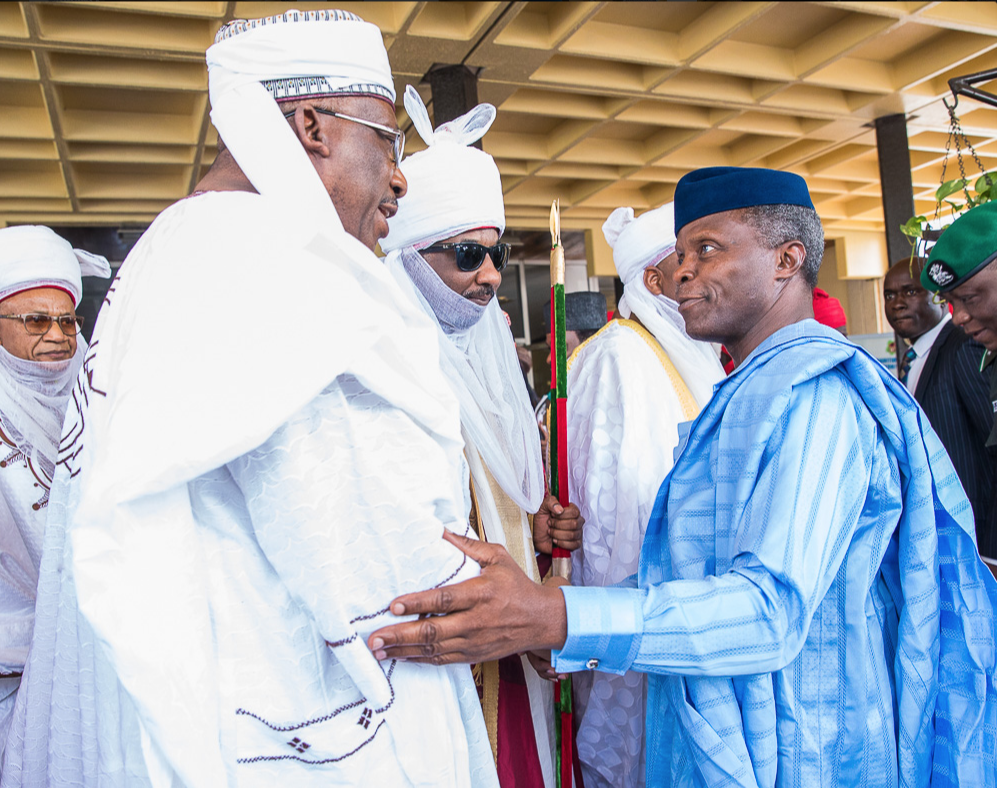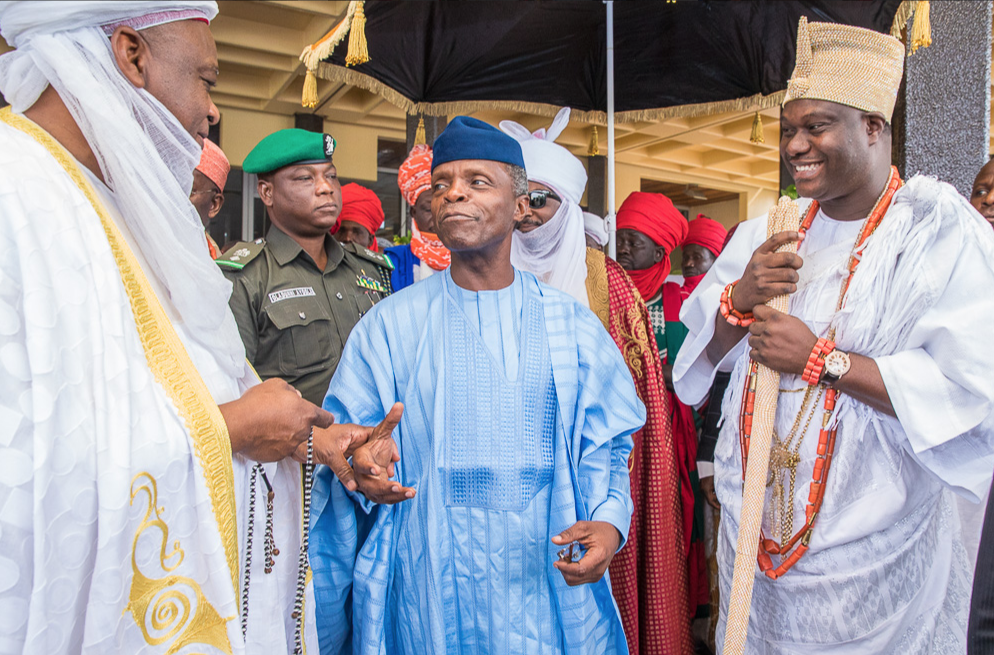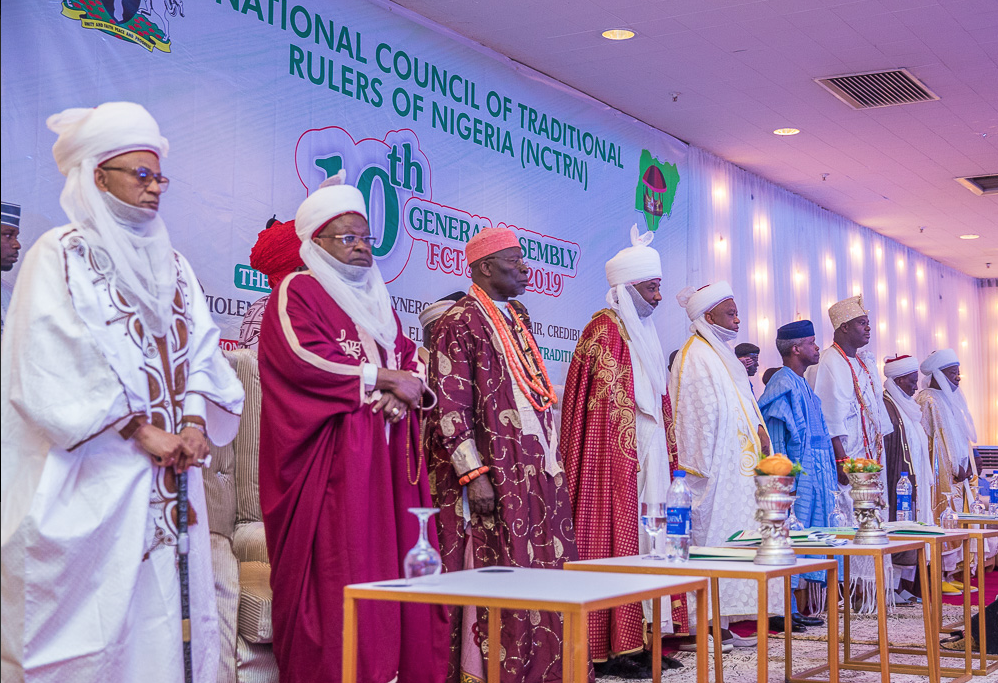VP’s Remarks At The 10th General Assembly Of The National Council Of Traditional Rulers
SPEECH GIVEN BY PROF. YEMI OSINBAJO, SAN, VICE PRESIDENT OF NIGERIA, ON BEHALF OF HIS EXCELLENCY, MUHAMMADU BUHARI, GCFR, AT THE 10TH GENERAL ASSEMBLY OF THE NATIONAL COUNCIL OF TRADITIONAL RULERS HELD IN ABUJA, 28TH JANUARY, 2019
Protocol
I am very delighted and I consider it a great privilege to be invited once again as the ‘Special Guest of Honour’ to this esteemed gathering of our Royal Fathers, the 10th General Assembly of the National Council of Traditional Rulers. It is indeed an honour to be in your midst and I thank your royal majesties immensely for inviting me.
This Royal gathering could not have come at a better time than this and the theme – “Building Synergy towards Free, Fair Credible and Violent-Free 2019 General Elections – the Role of Traditional Rulers” is most appropriate as the country prepares for the 2019 General Elections.
During the 9th General Assembly of this great council, I recalled my promise to work closely with the National Council of Traditional Rulers of Nigeria to take our dear nation to the next level, noting that any government that relegates Traditional Rulers to the background suffers a setback in her attempt to take governance to the grass-roots.
Let me, therefore, thank you immensely, on behalf of myself, government and people of this great country, for your support, prayers, fatherly counsel, advice and suggestions during the course of this administration.
I am most grateful and happy to inform this revered assembly that our country today is on the part of greatness once again. With your blessings, this administration under my leadership has recorded remarkable successes in the past three and a half years. Permit me to quickly refer to some these successes.
When this administration came on board in 2015, our ‘change agenda’ was premised on improving security, fighting corruption and revamping the economy, among others.
It gives me great pleasure to announce to you that the economy is back on the path of growth after the recession of end of 2015 – 2016.
Through the Economic Recovery and Growth Plan (ERGP), we charted a course for the Nigerian economy for the next four years (2017–2020). The vision of the ERGP is to restore economic growth, invest in Nigerians, and to build a globally competitive economy. The Plan is to stabilize the macroeconomic environment; achieve Agriculture and Food Security; ensure energy efficiency (in power and petroleum products); improve transportation infrastructure; and drive industrialization, primarily through Small Medium Enterprises (SMEs).
To this end, under the Federal Government’s diversification agenda, the agricultural sector received priority attention and the focus was on ensuring that we grow what we eat and strive to put an end to the importation of farm produce that can be grown here in our country and stop market monopoly.
Today we are the leaders of the world in the production of sorghum, millet, and cassava, and we are self-sufficient in paddy rice production, although there is still a lot to be done in terms of milling of rice.
To achieve this, we initiated the Anchor Borrowers’ Programme (ABP) of the Central Bank of Nigeria, the Presidential Fertilizer Initiative in partnership with the Government of Morocco, amongst others. Presently, more than 350,000 farmers are involved in the cultivation of Rice, Wheat, Maize, Cotton, Cassava, Poultry, Soy Beans and Groundnut on about 400,000 hectares of land across the nation.
Furthermore, the infrastructure in all the 12 River Basin Development Authorities (RBDAs) in the country was enhanced for effective use of the facilities for commercial farming and between 2016 and 2018, eight new rice mills have come on- stream in Nigeria.
The Bank of Agriculture (BOA) has been restructured, repositioned, re-capitalized, and consolidated, and in collaboration with the Bureau of Public Enterprises (BPE) loans at a single digit interest regime is disbursed in the agricultural sector as obtainable in developed and emerging economies.
As a result, more than 7million Nigerians are actively employed in the agricultural sector and we are working to ensure that agriculture will offer 20million jobs in the nearest future.
The inflation rate, as of December 2018, stands at 11.28 per cent and is expected to fall, while the country’s External Reserves is $45billion, the highest in 5 years. Nigeria’s economy has since bounced back after the recession and has continued to grow as the strongest stabilizing economy in Africa.
This administration has demonstrated a single-minded commitment to upgrading and developing Nigeria’s Transport, Power and Health Infrastructure.
In 2017, we issued a N100billion Sukuk Bond and from its proceeds, we are financing 25 major road projects in the six geopolitical zones and other rehabilitation projects ongoing across every State of the country, many of which had been abandoned in recent years because of mounting debts owed by the Federal Government to contractors.
We have embarked on a decisive course of building railways across Nigeria. The first phase of the Lagos- Kano rail, Lagos-Abeokuta-Ibadan will be completed at the end of this month. We have completed the Itakpe-Warri Railway, the Abuja light rail and the Abuja-Kaduna railway. We are embarking on the PH- Maiduguri and the Lagos Calabar route.
Despite earning 60% less than previous governments we have spent 2.7trillion on capital development the highest ever in the history of Nigeria. We have by ensuring financial integrity, been able to do more with less.
In the Power Sector, more than 2,000MW additional power generation capacity was achieved by the end of 2018, some of it through publicly owned plants and private sector investments supported by the Federal Government. Transmission, Expansion and Rehabilitation Programmes resulted in a 50 percent expansion in Grid Capacity. And the Distribution Expansion Programme (DEP) to increase distribution capacity in collaboration with the DisCos has since commenced.
We have adopted a policy of increasing power supply by decentralization of sources of power generation, so that power companies can provide power on a willing buyer willing seller basis.
Through the 4 components of the Social Investment Programme (SIP) – the N-Power Programme, Home Grown School Feeding Programme (HGSFP), Conditional Cash Transfer (CCT), and the Government Enterprise and Empowerment Programme (GEEP), the largest social safety net programme in the history of Nigeria.
Through our homegrown school feeding programme, we feed 9.3million children daily in 49,837 public primary schools in 26 states across Nigeria benefit daily.
At current numbers, the programme employs 95,422 cooks, and over 100,000 smallholder farmers linked to the program supplying locally sourced ingredients.
This translates to 594 cattle, 138,000 chickens, 6.8 million eggs, 83 metric tons of fish that are procured, prepared, and distributed each week. In our N-Power Jobs programme, we currently employ and pay 500,000 graduates and 20,000 non-graduates every month. Our Microcredit schemes, MarketMoni, FarmerMoni and TraderMoni have reached well over 2 million beneficiaries, all across Nigeria in every State.
Our anti-corruption War and transparency agenda has over the course of this administration, through Fiscal Reforms and Policies, plug leakages through which monies were being syphoned from the national treasury to the pockets of corrupt individuals.
One of such is the Whistleblower Policy, which so far has led to the recovery of N13.8billion from tax evaders, and N7.8 billion, $378million, £27,800 from public officials.
We equally increased our oversight of MDAs and have expanded and enforced the Treasury Account System (TSA).
Presently, the TSA system has been implemented in 92 percent of all MDAs and we are committed to its full implementation. The decision to fully operationalize the TSA has improved transparency and accountability in the management of all FGN receipts by providing a consolidated view of Government’s cash flow amongst others.
The deployment of BVN for Payroll and Social Investment Programmes, the creation of Asset Tracking and Management Project and so on, are measures that are yielding positives results in our anti-corruption war.
Obviously, these are developmental strides that would not have been possible if the Nigerian State was in turmoil, for it is in an atmosphere of order, peace and security that meaningful and sustainable development can be achieved. We owe these successes to your blessings and support in stabilizing your kingdoms and domains, and to all Nigerians.
As Nigerians gear up for the 2019 general elections, how do we build the synergies that are important in assuring free fair and peaceful elections? Coming at this time, this annual gathering of the Royal Heads of our Traditional Institutions is indeed a blessing, and the theme, most appropriate. This is because the role of your royal majesties and our traditional institutions is crucial for connecting the people of your kingdoms with the Federal and State agencies responsible for the conduct of the elections.
The major purpose of establishing that link is to educate the local electorate or reinforce information they may have on electoral processes as laid down by INEC. For example, INEC has said that in the forthcoming polls voters will be accredited and vote immediately after accreditation.
This is different from the old method of accreditation first and then coming back hours later to vote. This must be well disseminated to all. Similarly, the use of card readers, and the role of party agents, and other electoral actors, would require some dissemination, especially where the rules have changed. We expect that INEC will be working in collaboration with all our Royal Fathers in your kingdoms, to ensure that not only are you adequately prepared, but your people are also adequately informed.
Given the activities of unscrupulous individuals and groups who use the election season to forment trouble and, disrupt the electoral process the role of the security agencies is crucial. But the backbone of effective security is quality local intelligence. The most trusted repository of local intelligence is, of course, the Royal Father in his domain. We will encourage the security agencies to work closely with you in this enormous task.
As a nation with diverse norms, cultures, traditions, ethnic nationalities and religions, we have witnessed various degrees of conflicts and violence during elections in the past borne out of irresponsible utterances, and hate speech designed to incite and provoke disturbances. We must not tolerate this dangerous behaviour.
Your positions as traditional and spiritual heads of your communities accord you considerable influence and the respect of your subjects. We therefore urge you therefore, to take up your responsibilities of guidance and counselling, to enlighten them on the need to shun all forms of animosity, aggression, conflicts and violence before, during and after the elections, while mobilizing our people to participate, by voting for the candidates or parties of their choice at all levels, without fear of molestation, intimidation or harassment.
It is hoped that the friendships, partnerships and alliances for growth and development you have built over the years, under this royal umbrella would serve as a platform for building the synergy needed to ensure that the elections at all levels are free, fair, credible and violent-free. This synergy must however, be based on mutual trust and respect, without which we cannot stand against those who may wish to threaten the sovereign integrity of our country, Nigeria.
On the part of the Federal Government, I assure you that we are committed to delivering to Nigerians, transparent, free, fair, credible and peaceful elections.
In this regard, security agencies have been directed to maintain peace and order, and provide security during the elections. But any attempt to cause mayhem and undermine the electoral process will be met with the full force of the law.
The Independent National Electoral Commission (INEC), as an independent institution, charged with the mandate of conducting elections in Nigeria, is properly equipped and free to deliver on its mandate.
As a democracy in the 21st century, it is time for us to take our place in the comity of nations as one to be reckoned with, by ensuring that the 2019 General Elections meets the standard civilized processes around the world and are free from all forms of irregularities. I call on you, our dear Royal Fathers and well-meaning Nigerians, to join hands with the Government, in building the Nigeria that we can all be proud of.
On this note, may I most respectfully declare the 10th General Assembly of the National Council of Traditional Rulers open.
I thank you for this honour and wish you a fruitful deliberation.
Thank you.
God bless Nigeria!




